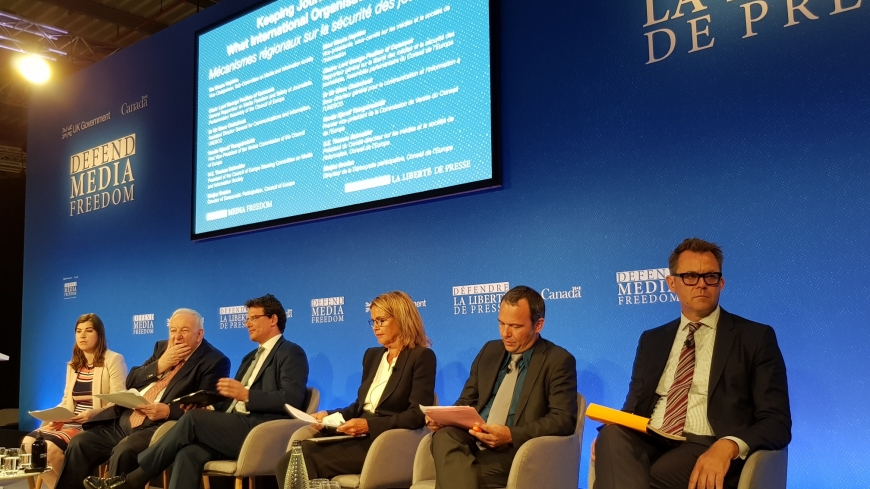Global Media Freedom Conference in London looks to ‘improve safety of journalists’
A report by AEJ UK member Firdevs Robinson
The first ever Global Conference for Media Freedom was co-hosted by Canada and the UK on 10 and 11 July. Delegations from over 120 countries, including 60 ministers, and more than 1,500 journalists, academics and campaigners gathered in London to promote media freedom worldwide and to create new mechanisms to alert and respond to cases of violations and abuse.
British Foreign Secretary Jeremy Hunt said that his aim for the conference was to work with his counterparts to agree on a way to protect media freedom and impose a cost on those who abuse it.
Along with his co-host, Canadian Minister of Foreign Affairs Chrystia Freeland, Mr. Hunt presented a Global Pledge on Media Freedom which commits the signatory states to “speak out and take action together”.
“Through a Media Freedom Coalition they would be harnessing the power of diplomatic networks to address emerging threats and opportunities”, officials said.
The list of participating governments is expected to be announced in September at the UN General Assembly.
Foreign Secretary Jeremy Hunt announced that the UK will commit £18 million to improve media freedom across the world and £3m of this over the next five years will go into a new Global Media Defence Fund that will provide legal advice for journalists and safety training for those reporting from conflict zones. The Fund will be administered by UNESCO and contributions are also being made by Canada and others.
The UK has also announced that a new National Committee for the Safety of Journalists will be set up. Earlier this year the OSCE urged each of its 57 participating states to establish a national committee for safety of journalists which would bring together representatives of the prosecutor’s office, police and journalists associations to verify that all attacks and threats are properly investigated.

At the London conference, an independent high-level panel of legal experts, chaired by former President of the UK Supreme Court Lord Neuberger, was established.
The Panel of Legal Experts brings together leading international experts on media freedom, including judges, lawyers and academics, from all over the world. The renowned human rights lawyer Amal Clooney, who has been appointed as the Foreign Secretary’s Special Envoy for Media Freedom, is among the members. They will be proposing legal and other initiatives to governments to help prevent and reverse media abuses.
At the Global Conference the OSCE’s Representative on Freedom of the Media, Harlem Desir, together with the UN Special Rapporteur on Freedom of Expression, David Kaye; the Organization of American States’ Special Rapporteur on Freedom of Expression, Edison Lanza; and the African Commission on Human and Peoples’ Rights’ Special Rapporteur on Freedom of Expression and Access to Information, Lawrence Mute, launched the “Twentieth Anniversary Joint Declaration: Challenges to Freedom of Expression in the Next Decade”.
This year’s Joint Declaration highlighted the proliferation of difficulties and threats faced by the media, including physical attacks against journalists, impunity, the impact of security policies on free speech, and the internet, digital media and media ownership issues.
The organizers of the conference declared it a great success but the gathering was not without controversy.
Index on Censorship condemned the decision by the UK Foreign Office to deny accreditation to Russia’s RT and Sputnik news agencies.
In several sessions, speakers and the audiences voiced concerns over making pledges that have so far not been followed up by concrete action.
On the eve of the conference, 33 press freedom and media organizations, including the AEJ, called on the participating states to release all imprisoned journalists immediately, stop killings and attacks on journalists, and put an end to impunity.
During the conference, the UN Special Rapporteur on extrajudicial, summary or arbitrary executions Agnes Callamard said that the continuing failure to bring to justice those responsible for the state killing of journalist Jamal Khashoggi in the Saudi Consulate in Istanbul last year showed the urgent need for a UN-led supranational process to investigate such crimes. At the London conference she proposed the establishment of a standing Investigation and Accountability Mechanism so that the path to justice would not depend on the flaws of national judicial systems. She called on governments “to put their economic interests aside in order to tackle impunity and stand up for human rights”.






